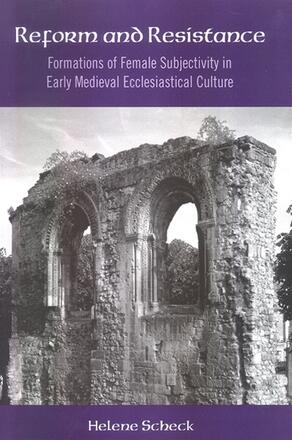
Reform and Resistance
Formations of Female Subjectivity in Early Medieval Ecclesiastical Culture
Alternative formats available from:
Explores the relationship between gender and identity in early medieval Germanic societies.
Description
Honorable Mention, 2010 First Book Prize presented by the Society for Medieval Feminist Scholarship
The early Middle Ages were a vibrant period rich with possibility for both men and women. Reform and Resistance explores the relationship between gender and identity in early medieval Germanic societies, centering mostly on competing perceptions of female subject formation in times of conversion, reform, and resistance. While women played an active role in the spread of Christianity during the Middle Ages, their freedoms were often restricted by the Church during periods of reform, when uniformity and conformity were important. Helene Scheck's inquiry extends beyond one specific region or historical moment through two centuries and three diverse Germanic regions: Carolingian France, late Anglo-Saxon England, and Ottonian Saxony. Each of these moments exhibits distinct yet interconnected stages of conversion and reform, different stages of cultural amalgamation out of which various possibilities for female subject formation emerge. The book also connects with current conversations about the interrelatedness of power, knowledge, and subjectivity, opening new possibilities for the study of women in early ecclesiastical cultures.
Helene Scheck is Assistant Professor of English at the University at Albany, State University of New York.
Reviews
"This challenging new book urges scholars to think hard about female personhood and its elusive relationships to hegemonic discourses on women and femininity, while modeling the difficulties of this kind of scholarly inquiry and the complex conceptual frameworks in which it must be conducted … Reform and Resistance is an exciting, and at times inspiring, study that challenges us to recognize the difficulties of understanding female subjectivity in the early Middle Ages, while elucidating the rich potential of bringing a comparative, interdisciplinary approach to this subject. " — Journal of English and Germanic Philology
"Helene Scheck has given us an erudite and original study that is not for the faint of heart … Reform and Resistance offers new ways to think about the lives and portrayals of women in the early Middle Ages and is an important contribution to ongoing, increasingly complex and nuanced conversations about medieval women and gender. " — H-France Review
"…ambitious in subject and scope … Reform and Resistance raises important questions about the development of ideas of women … [and] helps to fill the need for comparative studies of medieval women. " — Speculum – A Journal of Medieval Studies
"This book connects Anglo-Saxon and Anglo-Latin material to the fascinating work of Hrotsvit of Gandersheim. This connection has seldom, if ever, been made, and yet Scheck not only makes it but also explores it fully. She opens up new ways of reading both traditions. I also like the emphasis placed on Anglo-Latin and ecclesiastical culture, since it is more common for studies of women in the early Middle Ages to focus on vernacular and lay traditions. " — Shari Horner, author of The Discourse of Enclosure: Representing Women in Old English Literature